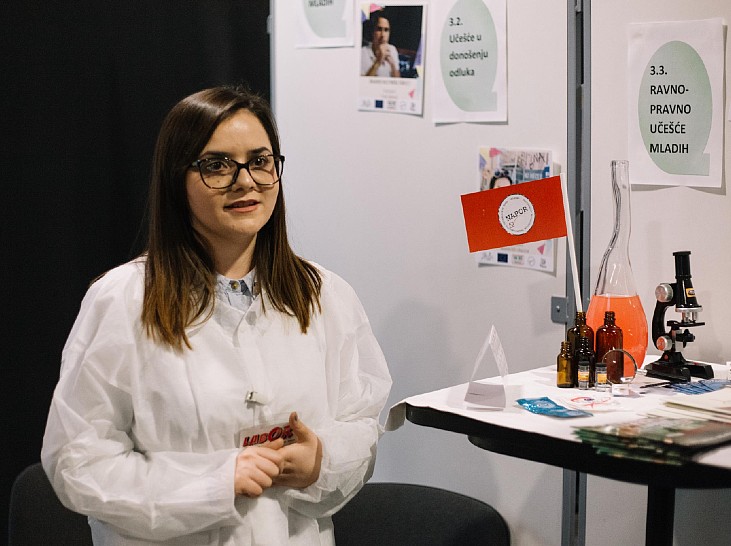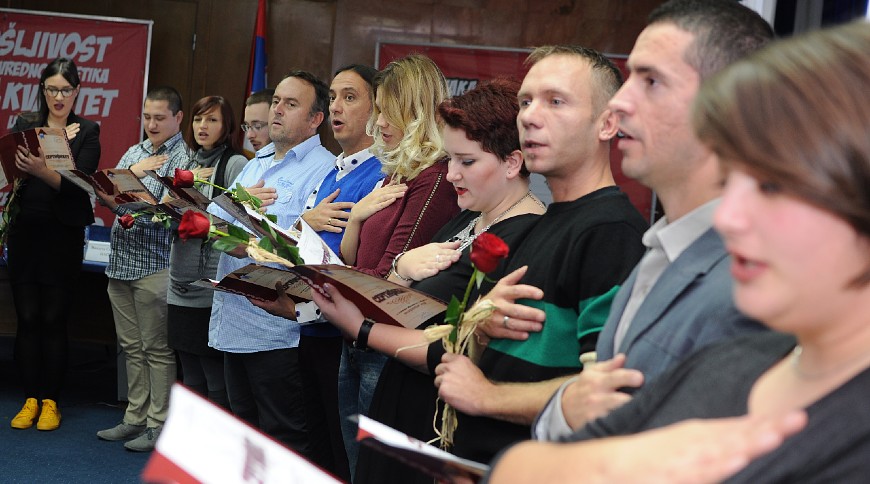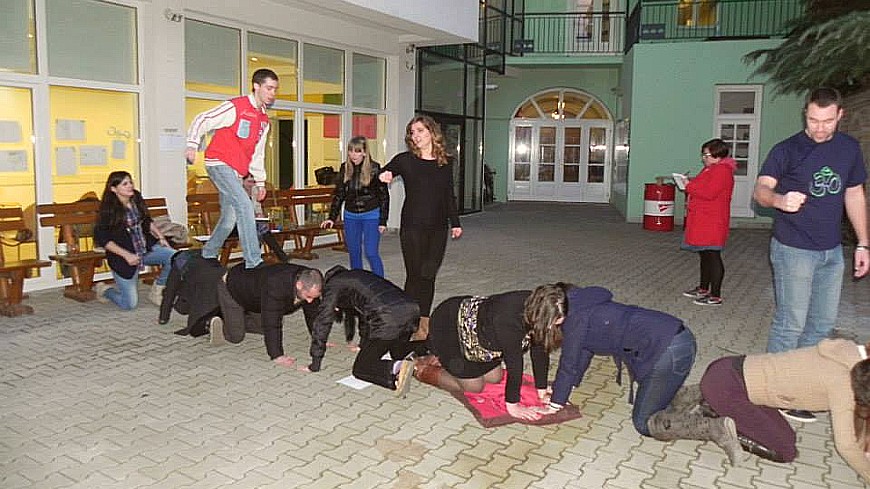Why sustainable funding of youth work programmes?
by Ivana Volf
09/06/2021
During a workshop on how youth work can respond to global challenges, which was part of the 3rd European Youth Work Convention, the discussion went in the direction of sustainable funding of youth work programmes. The assumption of colleagues on the workshop was that if we make youth work programmes sustainable and youth workers free of constant fundraising worries, we’d make the youth work sector more resilient to global challenges, free to innovate and follow young people’s needs.
I came to the convention, together with colleagues from the Serbian delegation, with this goal already in mind – to advocate for sustainable programmes of youth organisations. We have this in the strategic plan of the National Association of Youth Workers (NAPOR) in Serbia and we’ve been trying to find the best model for it.
Before we go on, let’s explain what we mean when we talk about sustainable funding of programmes in youth work. We’re aware that some youth spaces and programmes (youth centres and clubs) are publicly funded in some European countries. Still, in many countries, as is the case in Serbia, most or all of the youth work is done by the civil sector – youth associations. These organisations survive from project to project, often engaging youth workers on a voluntary basis and offering activities to young people only when funding is available and while projects last. So, here, when we talk about youth work programmes, we are mainly talking about programmes developed and implemented by associations. When we talk about sustainable funding, we mean the financial model and other kinds of support for those organisations to run long-term programmes with a certain level of quality. (Quality assurance in youth work is mostly done at national level, with a different set of criteria and assessment process. Information about the situation in most European countries can be found here).
The idea of sustainable youth work programmes isn’t new and it might seem obvious to most fellow youth workers, but the fact that it’s still not a reality in many places shows that it needs to be repeated many times and connected to any new topic that arises in the youth work field. So, let’s make one more case for sustainable funding of youth work programmes. Why does the youth sector need it? How does it improve the lives of young people? What does it bring to the community? And finally, what would it mean for youth workers?
This article will look at the need for more sustainable funding of youth work through NAPOR’s lens and the experience of youth workers and youth associations in Serbia. However, through conversations with colleagues during the convention and elsewhere, we’ve found that a lot of other European countries are in a similar situation and at different stages of the journey towards youth work programmes which aren’t dependent solely on short-term project-based funding. That is why we feel that the arguments in this article could be useful for colleagues in many European countries.
NAPOR was established 11 years ago, as an initiative of youth associations with different experiences, backgrounds and practices in youth work. The main need of associations and practitioners was, and still is, recognition of youth work as a vocation, but also as a service that has great impact on young people’s personal and social development, active participation in society, inclusion, employability, etc. (Using the term “vocation” here implies that we aren’t talking only about youth workers with a formal university degree, but also those who have built their competences through non-formal education and experience.) This is how two main directions of NAPOR’s work were defined: one was aimed at capacity building and professionalism of human resources within youth organisations, and the other was focused on quality assurance of programmes designed and implemented with and for young people. We strongly believe that by providing quality youth work programmes through organisations, youth work could gain wider recognition for its positive impact on young people and their local communities.

So now, our strategic goals have shifted from focusing on capacity building of individuals through educational programmes, to creating the conditions for making youth work programmes more sustainable. We’re looking for the best model, one which would answer to the needs of youth associations, young people, local communities and youth workers.
 How would sustainable youth work programmes improve the lives of young people?
How would sustainable youth work programmes improve the lives of young people?
Last year’s situation concerning the Covid-19 pandemic showed us how fragile the youth sector is. Some organisations lacked the capacity to transfer their activities into a digital format, which was the only possibility for reaching and involving young people. Some projects were paused, activities cancelled or postponed, and many organisations and youth workers found themselves stuck with handling requests from donors, modifying the format or timeline of their activities, dealing with issues important for the organisation’s survival, while young people were isolated in their homes, equally or more confused, and needing support from youth workers more than ever. (More information can be found in: Impact of COVID-19 on young people and on the youth sector)
Even without the pandemic, young people face a number of challenges during their adolescence, which is why youth work is important as a service to provide additional support during this turbulent time. Adding in global challenges like climate change, the rise of right-wing extremism, economic instability, and so on, makes the current generation of young people even more in need of youth work. And adequate support of youth workers and youth associations can’t be provided through one youth exchange or even a number of them, or through several workshops. Youth work has very ambitious goals – the personal and social development of young people into active citizens in their communities, as well as globally. Achievement of these goals takes time, a long-term approach, building and maintaining relationships, tailoring the approach to the specific target group, a lot of individual work with young people, etc. And all this, of course, can only be achieved with adequate and sustainable support to those who provide the programmes, in order to involve as many young people as we can and create opportunities for their continuous development.
 Why do youth associations need sustainable funding?
Why do youth associations need sustainable funding?
With the aim of assuring the quality of youth work programmes, NAPOR developed a set of standards for youth work programmes and a mechanism for the accreditation of member organisations. It’s an elaborate process combining organisations’ self-assessment and feedback from external experts – youth workers with extensive experience. This assessment and feedback then served as a starting point for developing an action plan for the improvement of youth work practice in certain areas, making the whole process developmental and supportive, as opposed to purely evaluative.
This process gave the network some valuable information about how youth work is developing at the local level, however in later years we noticed a decline in the quality of programmes. Attempts were made to offer capacity building through training and mentorship in order to introduce better practices. Still, the overwhelming conclusion is that our members have the knowledge and skills to provide more quality programmes, but something else is missing. And that something is sustainability.
If the support to youth work programmes becomes more sustainable, then associations wouldn’t put so much time and effort into fundraising by writing projects that usually can only cover a limited amount of activities and other costs. They would instead focus on different aspects of quality – reaching out to underprivileged and less active young people, inclusion of vulnerable groups, innovation in their methodology according to the needs of young people, long-term co-operation with local institutions, adjusting the approach to the individual young person, following their personal and social development, etc.
In one of the models NAPOR is developing, we’re proposing that the network would have the role of a hub for support, capacity building and collecting data from the field. The idea behind it is that when the programmes become long term, we can then set indicators and follow the impact of youth work on young people themselves, but also on the wider community. In addition, we’ll create a knowledge base with all the relevant resources needed for development and implementation of youth work programmes, enabling the transfer of knowledge from NAPOR to the associations themselves. This would enable further improvement of the programmes, following the actual needs of our target group, innovating our approach, thus creating real change. As you can imagine, this would be an ongoing process giving us the possibility of development, as well as assessment of our work. This is only one example of how we can create a system of sustainable support for youth work programmes, thus ensuring the quality of their delivery.

 What would sustainable youth work programmes bring to local communities?
What would sustainable youth work programmes bring to local communities?
Youth work, done at the local level, has to be implemented with regards to the community in which it takes place. Apart from youth associations, there are many other actors important in the life of a young person, and youth workers are supposed to co-operate with all of them. In current conditions, this is sometimes difficult to achieve – both for the lack of time and capacities of youth workers and organisations, and for the lack of recognition of youth work programmes in the community. Again, sustainable funding can help in this area, as the programmes supported by public funds from ministries or other governmental bodies would enjoy more recognition and trust from local institutions and other actors.
At the same time, youth associations would have the possibilities of involving more young people, thereby becoming more important actors in the eco-system of youth care. In addition to building relationships with young people, youth workers would build relationships with their parents, teachers, social workers, doctors, psychologists, and so on, acting as equal partners in dealing with the different challenges that young people face.
Local youth associations already co-operate with schools, social services, health centres, etc., involving practitioners from those institutions in their projects or working together with the same target group. They often detect similar problems and needs of the target group, while also seeing the possible areas for co-operation. Still, especially in our reality, none of those institutions have enough capacity or freedom to innovate their practice and include youth work in them. That’s why NAPOR sees long-term funded cross-sectoral youth services as one of the solutions, both for answering the needs of young people and their communities, but also for better sustainability of youth work programmes. One model that we’re developing would foresee funding for youth programmes created in co-operation with youth associations and public institutions (high schools, social services, high school student dormitories, etc). NAPOR would advocate for them at the national level, also offering support for their implementation, while organisations would need to mobilise partners in their communities to design proposals and apply for funding. In this way, youth work programmes would be funded in a more sustainable manner, at the same time encouraging local networking (youth associations with public institutions), building mutual trust and increasing recognition of youth work in communities.
 What would sustainable programmes mean for youth workers?
What would sustainable programmes mean for youth workers?
In the current circumstances, youth workers are living and working in almost constant uncertainty. They are spending a large amount of their working hours writing projects, building partnerships and ensuring funding for individual activities. On many occasions, their efforts aren’t rewarded with a positive response from donors, and very often they receive less funding than they had planned for. Added to that is the fact that in many local communities in Serbia (and I suppose elsewhere), funding for local projects is small, if at all. Youth workers then turn to international projects that offer more funding, but which usually support a limited number of activities, and with much less connection to the local community.
Many youth workers are deciding to get “real jobs”, while their work in the association is done voluntarily, usually due to the lack of sustainable funding. After a while many of them leave the sector entirely, after losing motivation, experiencing burnout or just realising that they can’t pay their own bills with the occasional fees for their work on projects. This trend of youth workers giving up on youth work is both a result of the lack of sustainable funding for programmes, but also makes the sustainability itself quite difficult to achieve. NAPOR and the youth associations put substantial resources into the capacity building of youth workers, who themselves spend hours of training, learning and gaining valuable experience, so it is a great loss for the youth work sector when any of them leave to use their competences elsewhere.

 Conclusion
Conclusion
These are just some of the reasons why sustainable funding for youth work is needed. That is not to say it would solve all the problems in the youth work sector or all the problems that young people face. Still, it can bring us closer to more quality support and care for young people’s development, better resilience of youth work to different challenges, equal and sustainable partnerships with local institutions and a better reputation in the community, as well as more dignified treatment of youth workers as professionals.




